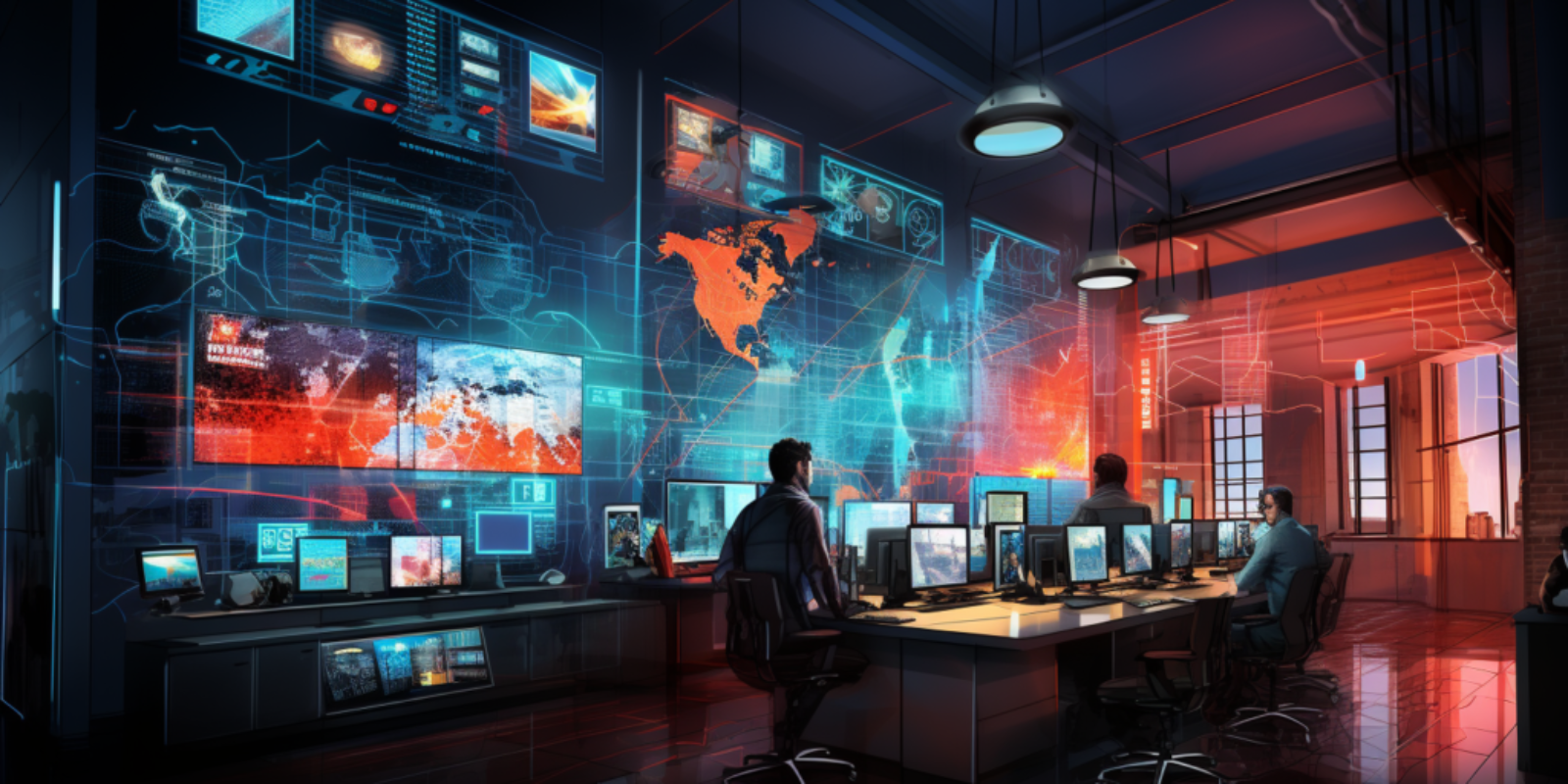Artificial Intelligence (AI) plays a significant role in enhancing cybersecurity measures. Its ability to analyze vast amounts of data and detect patterns makes it invaluable in identifying potential threats and preventing cyberattacks. AI-powered systems can continuously monitor network traffic, identify anomalies, and respond to potential breaches in real time, significantly reducing the time it takes to detect and mitigate cyber threats.
One of the primary advantages of AI in cybersecurity is its ability to adapt and learn from new threats. Traditional security systems often use predefined rules and signatures to identify malicious activities. However, cybercriminals constantly evolve their tactics, making it challenging for conventional systems to keep up. Conversely, AI can learn from new attack patterns and update its algorithms accordingly, providing a more proactive defense against emerging threats.
AI can also help automate routine security tasks, freeing human resources to focus on more complex issues. Tasks such as patching vulnerabilities, monitoring system logs, and analyzing security alerts can be time-consuming and prone to human error. Organizations can improve efficiency and reduce the risk of human oversight or negligence by automating these processes with AI.
However, it is essential to note that AI is not a silver bullet solution for cybersecurity. It is just one component of a comprehensive security strategy. Human expertise and intervention are still crucial in interpreting AI-generated insights, making strategic decisions, and responding to sophisticated attacks that may bypass AI defenses.
Furthermore, as AI continues to advance, so do the capabilities of cybercriminals. Adversarial AI techniques can be used to manipulate or deceive AI systems, making it imperative for cybersecurity professionals to stay ahead of the game. Ongoing research, collaboration, and regular updates to AI models are essential to ensure their effectiveness in combating evolving threats.
In conclusion, AI has become an indispensable tool in the fight against cyber threats in the digital age. Its ability to analyze vast amounts of data, adapt to new threats, and automate routine tasks makes it valuable for enhancing cybersecurity measures. However, it is crucial to remember that AI is not a standalone solution. It should be integrated into a comprehensive security strategy that includes human expertise and continuous monitoring and updating of AI models. Only by combining human intelligence with AI capabilities can we effectively protect ourselves against the ever-evolving threats of the digital age.
AI and Cybersecurity: Protecting Against the Threats of the Digital Age
In today’s digital age, where technology is advancing at an unprecedented pace, the need for robust cybersecurity measures has become more critical than ever before. With increasing cyber threats and attacks, organizations and individuals must stay one step ahead to protect their sensitive information and assets. This is where the power of Artificial Intelligence (AI) comes into play.
AI has emerged as a game-changer in the field of cybersecurity. Its ability to analyze vast amounts of data, detect patterns, and identify anomalies makes it an invaluable tool in protecting against cyber threats. Organizations can enhance their security systems by leveraging AI algorithms and proactively defending against potential attacks.
One of the key areas where AI is making a significant impact is threat detection. Traditional cybersecurity systems rely on predefined rules and signatures to identify known threats. However, these approaches are no longer sufficient with the ever-evolving nature of cyber attacks. AI-based systems, on the other hand, can continuously learn from new data and adapt to emerging threats. They can detect and respond to previously unseen attack patterns, minimizing the risk of breaches.
AI also plays a crucial role in incident response and mitigation. In the event of a cyber attack, AI-powered systems can quickly analyze the attack vectors, identify affected areas, and take immediate action to contain the breach. This rapid response time is essential in minimizing the damage caused by an attack and preventing further spread within the network.
Furthermore, AI can assist in vulnerability management by identifying potential weaknesses in an organization’s infrastructure. AI algorithms can pinpoint vulnerabilities that hackers may exploit by analyzing system logs, network traffic, and user behavior patterns. This enables organizations to patch these vulnerabilities before they can be leveraged for malicious purposes.
Another area where AI excels is in user authentication and access control. Traditional methods such as passwords or two-factor authentication are often vulnerable to attacks. AI can enhance these authentication mechanisms by analyzing user behavior, device information, and contextual data to determine the legitimacy of access requests. This helps in preventing unauthorized access and protecting sensitive information.
However, while AI offers numerous benefits in cybersecurity, it is not without its challenges. One significant concern is the potential for adversarial attacks, where hackers exploit vulnerabilities in AI algorithms to bypass security measures. To mitigate this risk, ongoing research and development are crucial to stay ahead of attackers and continuously improve AI-based security systems.
In conclusion, as the digital landscape becomes increasingly complex, the importance of AI in cybersecurity cannot be overstated. Organizations can significantly enhance their cybersecurity defenses by leveraging AI’s threat detection, incident response, vulnerability management, and user authentication capabilities. However, it is essential to remain vigilant and address the challenges associated with AI-based security systems. With a proactive approach and continuous innovation, we can protect against the ever-evolving threats of the digital age.
Pros & Cons of AI and Cybersecurity
Pros Of AI and Cybersecurity:
-
Enhanced threat detection: AI can analyze vast amounts of data and identify patterns humans might miss. This can help in detecting cyber threats more effectively and promptly.
-
Efficient incident response: AI-powered cybersecurity systems can automate incident response, reducing the time it takes to identify and mitigate cyber-attacks. This can save valuable time and resources.
-
Real-time monitoring: AI can continuously monitor network traffic and user behavior, detecting any anomalies or suspicious activities in real time. This proactive approach helps prevent potential cyber threats before they cause significant damage.
-
Adaptive defense mechanisms: AI algorithms can learn from past attacks and adapt their defense mechanisms accordingly. This enables cybersecurity systems to become more robust and effective over time.
-
Improved authentication: AI can enhance authentication processes by analyzing user behavior, biometrics, and other factors to ensure secure access to systems and data.
Cons Of AI and Cybersecurity:
-
False positives: AI-powered systems may sometimes generate false alarms, flagging legitimate activities as potential threats. This can lead to unnecessary disruptions and wasted resources.
-
Complexity: Implementing AI in cybersecurity requires specialized knowledge and expertise. Organizations may face challenges integrating AI technologies into their infrastructure and ensuring proper functioning.
-
Lack of human intuition: While AI efficiently detects known patterns, it may struggle with identifying emerging or unknown threats that require human intuition and contextual understanding.
-
Vulnerability to attacks: AI can be targeted by malicious actors who exploit vulnerabilities in the algorithms or manipulate the training data. This poses a new set of security risks that need to be addressed.
-
Ethical concerns: The use of AI in cybersecurity raises ethical questions regarding privacy, data protection, and potential biases in decision-making processes. It is crucial to establish clear guidelines and regulations to address these concerns.
Overall, AI has the potential to enhance cybersecurity capabilities significantly, but its implementation should be carefully planned and monitored to mitigate potential risks and ensure ethical use.
FAQs about AI and Cybersecurity: Protecting Against the Threats of the Digital Age
-
What is the role of AI in cybersecurity?
AI plays a crucial role in cybersecurity by automating tasks like threat detection, anomaly detection, and incident response. It can analyze vast amounts of real-time data, identify patterns, and help security professionals respond to threats more effectively. -
How can AI be used to detect and prevent cyber-attacks?
AI can be used to detect cyber attacks by analyzing network traffic, user behavior, and system logs for unusual patterns or anomalies. It can also help prevent attacks by identifying vulnerabilities and recommending mitigation measures. -
Can AI-powered tools replace human cybersecurity professionals?
While AI can automate specific tasks and enhance the capabilities of cybersecurity professionals, it cannot wholly replace human expertise. Human professionals still need to interpret AI-generated insights, make critical decisions, and respond to complex threats that require human judgment. -
What are the potential risks of using AI in cybersecurity?
One potential risk is that attackers could exploit vulnerabilities in AI systems to launch sophisticated attacks. Additionally, AI algorithms may produce false positives or negatives, leading to unnecessary alerts or missed threats. -
How can AI help in incident response and recovery?
AI can assist in incident response by quickly identifying and containing threats, providing real-time insights into attack vectors, and automating recovery. It can also help in post-incident analysis by providing detailed reports on the attack. -
Are there any ethical concerns related to AI in cybersecurity?
Yes, there are ethical concerns related to AI in cybersecurity. For example, there may be issues with privacy and data protection when using AI algorithms that process personal information. There is also a concern about bias in AI algorithms that could lead to discrimination or unfair treatment. -
Can hackers use AI for malicious purposes?
Yes, hackers can potentially use AI for malicious purposes. They could use AI algorithms to automate attacks, evade detection systems, or even create deepfake content to deceive individuals or organizations. -
How can organizations ensure the security of their AI systems?
To ensure the security of AI systems, organizations should implement robust security measures such as secure coding practices, regular vulnerability assessments, and encryption of sensitive data. They should also stay updated with the latest AI security best practices and conduct thorough testing before deploying AI systems. -
What are some challenges in implementing AI in cybersecurity?
Some challenges in implementing AI in cybersecurity include the need for large amounts of high-quality training data, the complexity of AI algorithms, and the shortage of skilled professionals who can develop and maintain AI systems. -
How can individuals protect themselves from AI-powered cyber threats?
Individuals can protect themselves by practicing good cybersecurity hygiene, such as using strong and unique passwords, keeping software up to date, being cautious of phishing emails, and using reputable security software. Additionally, staying informed about the latest AI-related threats and best practices can help individuals better protect themselves.



